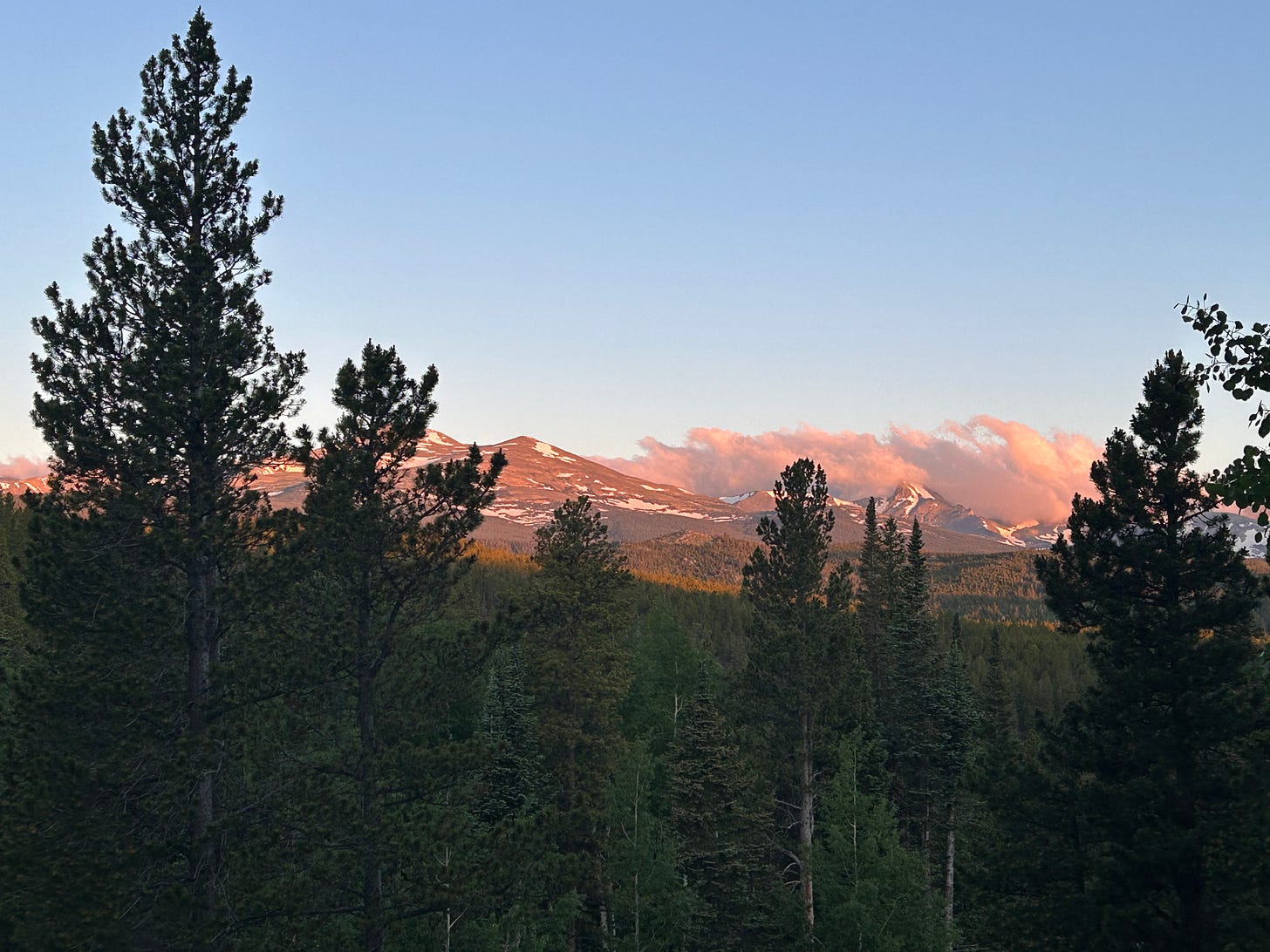As Children Of The Forest, Green Spaces Will Help Us Live Longer
Our early human ancestors descended from the trees 4.2 million year ago, so in many ways, we’re children of the forest.
I find it profoundly depressing whenever people say they’re “here for a good time not a long time.” What are they saying? Well, what they mean is they would rather spend 50 years coping on their impulses (if that), than 100 years reaching for their full potential.
The remark is often ripped as a joke, but the sentiment lingers with an underlying sincerity that sometimes never goes explored.
My lease in Denver officially ended last week. I moved out of the city in early June to a property about 30 minutes west of Boulder tucked into the mountains adjacent to the Roosevelt and Arapaho National Forests. When I step outside my door, I’m surrounded by a sea of evergreens stretched for miles up to the Indian Peaks.
Already, I can feel my regular cortisol levels having plummeted to a fraction of what they were a month ago. I came out here for a myriad of reasons, one of which served as the impetus of this newsletter: how can we live as long as possible? Not only that, how can we live as well as possible for the length of time that we’re here? I’d rather relish in weekday afternoons doing yoga in the mountains than suffer chronic hangovers in a polluted city. The former is far more conducive to old age. In some respect, I moved to 9,500 feet searching at 26 for the fountain of youth. New research says I may have found it.
As American lifespan declines, a new study out Wednesday reveals trees are key to longevity.
A dozen researchers primarily from Northwestern University published their findings in the peer-reviewed journal Science Advances where they concluded those with long-term exposure to green spaces experienced slower epigenetic aging. In other words, exposure to greenery helped individuals live longer. Those the study surveyed over a 20-year period lived an average of 2.5 years longer if they lived within 5 km to a park.
Researchers analyzed the blood DNA of more than 900 participants across four American cities to determine how green spaces impact aging.
“Our study shows that being near green space caused some biological or molecular changes that can be detected in our blood,” said Northwestern University Preventative Medicine Professor Lifang Hou, the study's lead investigator, in an interview with the Washington Post.
Participants’ blood DNA was examined to measure biological age versus chronological age. The former is determined by epigenetics based on daily activity while the latter is independent of environmental circumstances. Biological age can be influenced by lifestyle habits such as drug use and exercise. Individuals whose biological age is older than their chronological age are more likely to develop chronic conditions such as cancer and diabetes.
“The study, however, emphasizes that it’s not only about what each person individually does for their own health, but also their neighborhoods and communities,” [Hou] said, according to the Washington Post.
The paper adds to the overwhelming mountain of scientific evidence showcasing how human health is fundamentally linked to outdoor spaces. In 2017, National Geographic ran a feature highlighting how “We Are Wired To Be Outside.”
Our early human ancestors descended from the trees 4.2 million year ago, so in many ways, we’re children of the forest.
Another study published in December linked trees to longevity by examining mortality rates in areas where non-profits planted trees. It turns out that in neighborhoods with more trees, fewer people died.
Brooklyn-area author Alice Peck outlines in her 2019 book, “the Green Cure,” how intentional time with trees can boost one’s focus and immune system, regulate hormones, lower blood glucose, and speed up recovery from illness.
“Any walk outdoors is good for you, but if you can get to some woods, that’s even better,” Peck wrote in her chapter on forest bathing. In urban city centers, even just a “park, a tree-lined road, or a couple of trees in a backyard or courtyard can help.”
In one of his letters, Seneca advised “no man can have a peaceful life who thinks too much about lengthening it.”
That’s fair, but let’s not carelessly shorten it either. In the meantime, don’t forget about the importance of the sun.
Links:
The Federalist: You Don’t Need National Parks To Find Summer Solitude
The Federalist: Erectile Dysfunction Is Now So Common Men Can Get Remedies Over The Counter
The Federalist: American Medical Association Says BMI Is Bad Because Racism, While Promoting Abortion As ‘Health Care’
The Federalist: ‘Pride’ Month Is Way Too Long
New York Times: The ‘Quiet Disease’ Lingering In Our Mouths
Washington Examiner: Congress’ farm bill could improve our health
Washington Post: Australia Offers MDMA drug therapy for PTSD, a world first
Photos:
<a href=“Marcus Aurelius | The head of Marcus Aurelius found in the P… | Flickr“>Bradley Weber / Flickr </a> / <a href=“https://creativecommons.org/licenses/by/2.0/“>CC BY 2.0</a><a href=“Colorado Morning Afterglow (Explored May 2022) | WEBSITE Flu… | Flickr“>G. Lamar/ Flickr </a> / <a href=“https://creativecommons.org/licenses/by/2.0/“>CC BY 2.0</a>

